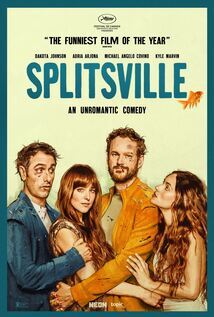

The sophomore outing of writer/producer/director Michael Angelo Covino and writer/producer Kyle Marvin (who together run the production company Watch This Ready) is a hilarious farce about modern marriage and how a lack of self-awareness manifests differently in men and women. Covino and Marvin star as late-thirties dudes dealing with the complications of contemporary relationships. Both are married to women who are out of their league (Dakota Johnson and Adria Arjona), and both are far more insecure about their feelings and their self-image than they'd like to believe. The movie is ostensibly a comedy about polyamory, but it digs so much deeper than what you might expect from that description.
I call the film a farce because the physical comedy these actors/filmmakers engage in, along with the extremity of the situations their characters find themselves in, is wildly exaggerated. Yet I think there is more truth in this broad laughfest than in this year's more highbrow Dakota Johnson movie, Materialists, Celine Song's overly cerebral romantic drama. There's also a lot more subtlety than in the year's other questioning-a-long-term-relationship picture, Michael Shanks' heavy-handed allegorical body horror thriller, Together. And there are about a hundred times more earned laughs here than in Andrew DeYoung's shallow exercise in forced "cringe comedy," Friendship.
The ensemble assembled here is fantastic. Aside from Johnson, who is wonderful in the picture (she's so smart to take so many small indie movies that offer far meatier roles than studios can these days), and a hilarious late-in-the-film supporting turn by Nicholas Braun, I wasn't familiar with any of these actors. Nor have I seen Covino and Marvin's prior feature, The Climb, but I will be dialing it up immediately. These folks understand that film comedy is not stand-up comedy, nor improv comedy, nor funny people mugging for a camera. Rather than beating their premise to death, these writers mine as many potential variations of their comedic premise as possible without violating the credibility of the characters they establish or their film's internal logic. As directors, every wacky set piece they stage and each hilarious heightening of the situation builds on what has come before, resulting in a character-driven broad comedy that is surprisingly relatable.
Splitsville isn't just funny and insightful; it's so inventively structured that, aside from the ultimate resolution, I had no idea where it was going to go from moment to moment. Even more thrilling is that, unlike 90% of comedies made today, these guys took the time to write a great script and committed to shooting it in a way that requires putting actual thought into how their scenes would play out. I'm so accustomed to comedy directors using multiple cameras to capture flat, uninspired shots of actors frantically improvising various joke-joke-joke options to be later assembled into a choppy, awkward mash in the editing room, that I thought comedy cinema was a lost art. Many of the best sequences in Splitsville are covered in long, complex takes that must have necessitated careful blocking and a considerable amount of rehearsal, yet they play as effortlessly spontaneous.
I complain so much about how comedy has suffered in the post-Apatow, post-Curb, post-actually-watching-the-movie-you're-watching era. I also lament that while many contemporary filmmakers make the effort to shoot on celluloid, not enough know how to use the format to achieve something more than the equivalent of an Instagram filter. Therefore, I can't tell you how happy it makes me to see that there are still young filmmakers out there who understand that the art of great comedy cinema is crafted through writing, planning, working out beats, and carefully layering jokes and gags, all the while trusting that what they thought was funny during each stage really is funny. Rehearsing only stifles spontaneity if you're working with amateurs, hacks, or comedians who can't act, and sacrificing the visual aspects of comedic storytelling just so that you can have twenty different versions of a joke to choose from during the final stage of editing is a sucker's deal. These guys clearly get that the greatest film comedies rely on much more than funny dialogue. This picture made my summer. I'll be even happier if the film does well at the box office, but that's probably way too much to hope for.
Four friends attempt to unlock the secret to happiness in their relationships by experimenting with open marriage in this hilarious, well-crafted, and surprisingly relatable farce from filmmaker/stars Michael Angelo Covino and Kyle Marvin.




